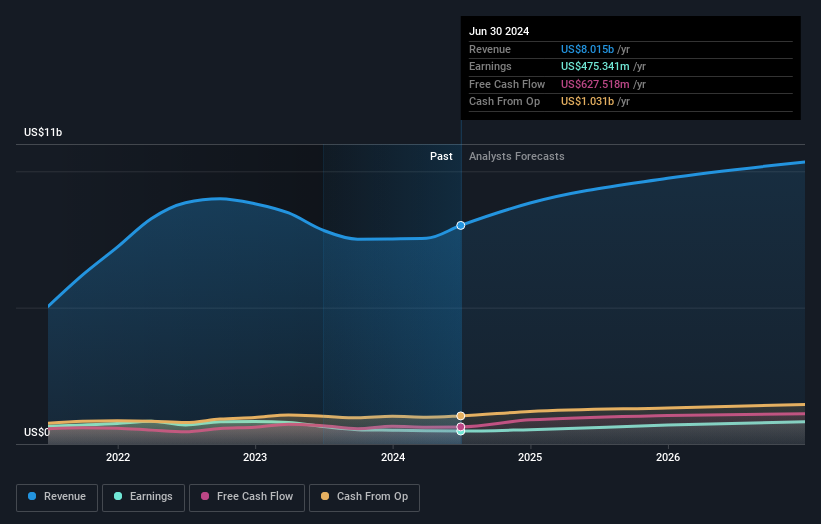- Canada
- /
- Transportation
- /
- TSX:TFII
With 6.6% one-year returns, institutional owners may ignore TFI International Inc.'s (TSE:TFII) 4.8% stock price decline

Key Insights
- Significantly high institutional ownership implies TFI International's stock price is sensitive to their trading actions
- A total of 11 investors have a majority stake in the company with 50% ownership
- Recent purchases by insiders
To get a sense of who is truly in control of TFI International Inc. (TSE:TFII), it is important to understand the ownership structure of the business. And the group that holds the biggest piece of the pie are institutions with 73% ownership. Put another way, the group faces the maximum upside potential (or downside risk).
Losing money on investments is something no shareholder enjoys, least of all institutional investors who saw their holdings value drop by 4.8% last week. However, the 6.6% one-year returns may have helped alleviate their overall losses. They should, however, be mindful of further losses in the future.
Let's delve deeper into each type of owner of TFI International, beginning with the chart below.
Check out our latest analysis for TFI International

What Does The Institutional Ownership Tell Us About TFI International?
Institutional investors commonly compare their own returns to the returns of a commonly followed index. So they generally do consider buying larger companies that are included in the relevant benchmark index.
TFI International already has institutions on the share registry. Indeed, they own a respectable stake in the company. This suggests some credibility amongst professional investors. But we can't rely on that fact alone since institutions make bad investments sometimes, just like everyone does. When multiple institutions own a stock, there's always a risk that they are in a 'crowded trade'. When such a trade goes wrong, multiple parties may compete to sell stock fast. This risk is higher in a company without a history of growth. You can see TFI International's historic earnings and revenue below, but keep in mind there's always more to the story.

Investors should note that institutions actually own more than half the company, so they can collectively wield significant power. We note that hedge funds don't have a meaningful investment in TFI International. The company's largest shareholder is Capital Research and Management Company, with ownership of 17%. In comparison, the second and third largest shareholders hold about 5.5% and 4.5% of the stock. Alain Bedard, who is the second-largest shareholder, also happens to hold the title of Chief Executive Officer.
A closer look at our ownership figures suggests that the top 11 shareholders have a combined ownership of 50% implying that no single shareholder has a majority.
While studying institutional ownership for a company can add value to your research, it is also a good practice to research analyst recommendations to get a deeper understand of a stock's expected performance. There are plenty of analysts covering the stock, so it might be worth seeing what they are forecasting, too.
Insider Ownership Of TFI International
The definition of company insiders can be subjective and does vary between jurisdictions. Our data reflects individual insiders, capturing board members at the very least. Company management run the business, but the CEO will answer to the board, even if he or she is a member of it.
I generally consider insider ownership to be a good thing. However, on some occasions it makes it more difficult for other shareholders to hold the board accountable for decisions.
Our most recent data indicates that insiders own some shares in TFI International Inc.. Insiders own CA$945m worth of shares (at current prices). Most would say this shows a good alignment of interests between shareholders and the board. Still, it might be worth checking if those insiders have been selling.
General Public Ownership
The general public-- including retail investors -- own 21% stake in the company, and hence can't easily be ignored. This size of ownership, while considerable, may not be enough to change company policy if the decision is not in sync with other large shareholders.
Next Steps:
It's always worth thinking about the different groups who own shares in a company. But to understand TFI International better, we need to consider many other factors. Consider for instance, the ever-present spectre of investment risk. We've identified 1 warning sign with TFI International , and understanding them should be part of your investment process.
But ultimately it is the future, not the past, that will determine how well the owners of this business will do. Therefore we think it advisable to take a look at this free report showing whether analysts are predicting a brighter future.
NB: Figures in this article are calculated using data from the last twelve months, which refer to the 12-month period ending on the last date of the month the financial statement is dated. This may not be consistent with full year annual report figures.
Valuation is complex, but we're here to simplify it.
Discover if TFI International might be undervalued or overvalued with our detailed analysis, featuring fair value estimates, potential risks, dividends, insider trades, and its financial condition.
Access Free AnalysisHave feedback on this article? Concerned about the content? Get in touch with us directly. Alternatively, email editorial-team (at) simplywallst.com.
This article by Simply Wall St is general in nature. We provide commentary based on historical data and analyst forecasts only using an unbiased methodology and our articles are not intended to be financial advice. It does not constitute a recommendation to buy or sell any stock, and does not take account of your objectives, or your financial situation. We aim to bring you long-term focused analysis driven by fundamental data. Note that our analysis may not factor in the latest price-sensitive company announcements or qualitative material. Simply Wall St has no position in any stocks mentioned.
About TSX:TFII
TFI International
Provides transportation and logistics services in the United States and Canada.
High growth potential and fair value.
Similar Companies
Market Insights
Community Narratives




